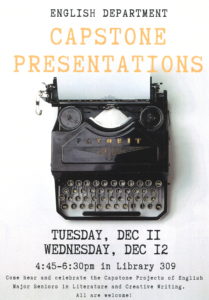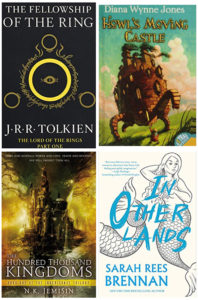Fantastic Fall Capstones
Contact
The Words: Macalester's English Student NewsletterSenior Newsletter Editors:
Birdie Keller '25
Callisto Martinez '26
Jizelle Villegas '26
Associate Newsletter Editors:
Ahlaam Abdulwali '25
Sarah Tachau '27
Alex Harrington ’19

It is a truth universally acknowledged that a senior English major completing their capstone must deliver constant heaving sighs. The capstone is designed to be a culmination of each student’s academic career, and generally takes the form of a semester-long independent project with consistent workshopping and advice from classmates and a professor. This semester, the department was lucky to have Professor Marlon James and Professor Wang Ping offering creative writing capstone opportunities, and Professor James Dawes instructing the literature capstone class.
Professor James’ creative writing capstone is an exercise in ambition titled “Fifteen Weeks to the Novel.” He aims to instruct students in writing 50,000 words or more over the course of the semester. Professor James expected students to begin the “Advanced Writers Workshop” with a story idea and summary so that all of class time “will be spent reading and writing.” Ultimately, the intention of the creative writing capstone is to “present new and revised work, critique and encourage, and more than anything else work towards that moment where all that’s left to write is THE END.”
Professor Wang’s “Prose Poems and Chapbooks” is a mixed class with two capstone students. The workshop class is designed to “focus on the play and risk of language and consciousness through the form and content of prose poetry,” with an end goal of producing a manuscript for a 15-25 page chapbook as well as a physical book. Professor Wang says “everyone is writing beautifully and powerfully,” and believes that renowned poet Gary Snyder’s October visit “pushed them to a higher level.”
For the literature capstone, there are three main goals: “to provide students with the opportunity to develop an original research project that reflects their deepest aesthetic interests and ethical commitments,” “to provide instruction in advanced methods of research by studying influential critical approaches from the early twentieth century to the present,” and “to train students to become advocates of their research agenda.”

Mari Riffle ’19 is completing her capstone in literature this semester with a project that examines the “evolution of heroes in fantasy fiction over time.” To do so, Riffle looks at four novels: J. R. R. Tolkien’s 1954 The Fellowship of the Ring, Diana Wynne Jones’s 1986 Howl’s Moving Castle, N. K. Jemisin’s 2010 The Hundred Thousand Kingdoms, and Sarah Rees Brennan’s 2017 In Other Lands. Based on Tolkien’s fantasy legacy, Riffle establishes the “Tolkienian heroic model,” and holds the protagonists of each of her case studies up to this mold. “Interestingly,” she says. “The one trait that never changes is that the hero comes from obscurity.” Though fantasy heroes have consistently come from anywhere, Riffle says the trends are changing to allow heroes to also be anyone, regardless of race, gender, or sexuality.
Riffle said that the large amount of feedback each student received in the class helped her concretize her ideas and solidify what she wanted to say. From the get-go, she said, Professor Dawes wanted to establish the class as a cohort of colleagues; a mission that was ultimately met with success. Riffle says that her classmates have “become colleagues and friends,” and that she “really respects and values critiques given to [her] by classmates.”
To hear about the rest of the capstone projects and support the ambitious, capable students completing them, be sure to attend the capstone presentations on Tuesday, December 11 and Wednesday, December 12 from 4:45-6:30 PM in Library Room 309.